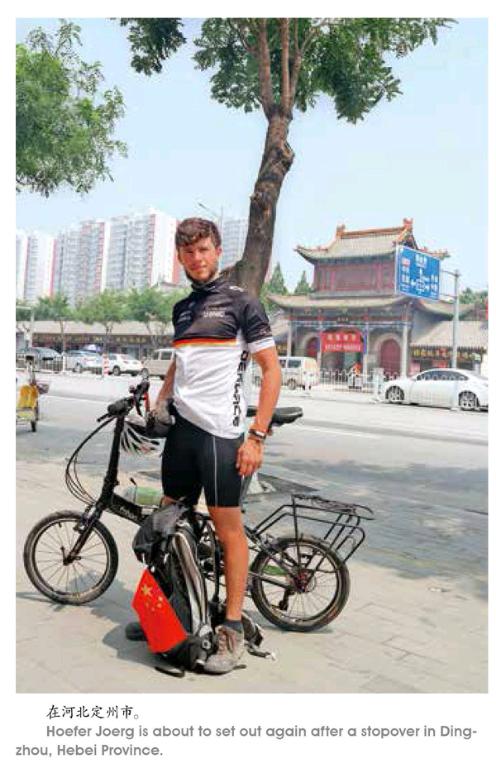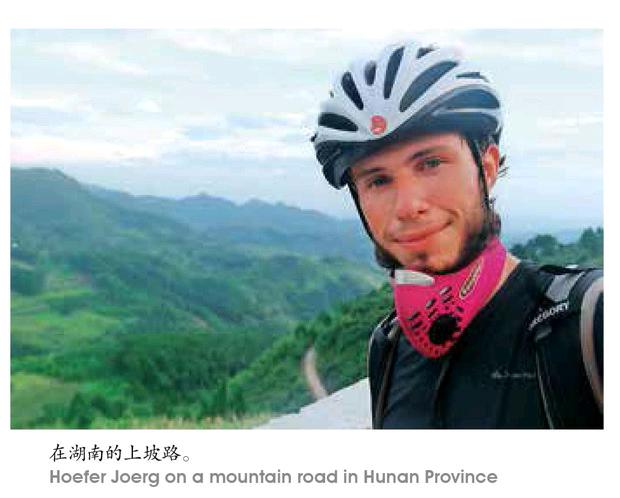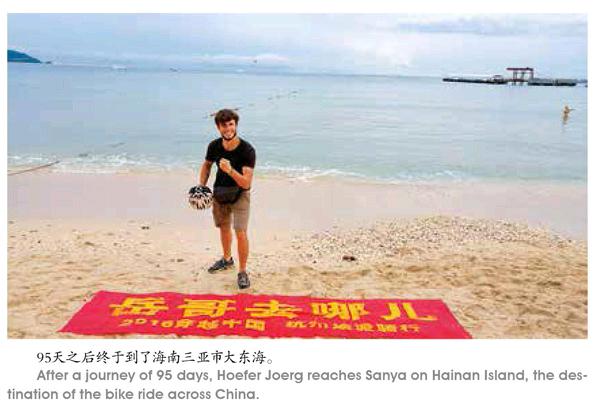德国小伙骑行万里寻找中国梦
2018-03-09王湛吴荃雁
王湛+吴荃雁
20年前,有位美国人,名叫彼得·海斯勒,来到中国,教过书,当过记者,待了10多年,游历了中国的角角落落。10年前,这位美国人将他的经历写成了“中国三部曲”,引起了广泛关注。

而如今在浙江大学,有一位中文名叫岳凯涵的德国留学生,骑着一辆小型折叠车,行程5800公里穿越中国。从黑龙江漠河北极村,一直到海南三亚,这趟旅程历经近100天。
现在,他已经硕士毕业回到了德国慕尼黑。我和他约了北京时间17:00的微信电话采访,心里想着德国人以严谨著称,习惯准时,千万不能迟到。
果然,17点整,微信那一头传来了热情的声音。出乎我的意料,他的汉语说得很好。
喜爱中华文化,到浙江大学攻读中国学
岳凯涵的本名叫Jorg,29岁的他陆陆续续在中国待了三年半。
“这个中文名是我朋友给我取的。他觉得岳的发音和我的名字很像,而凯涵很适合我的性格。”岳凯涵说,“我觉得我是个活泼、乐观、有活力又有好奇心的人。”
2011年,岳凯涵第一次来到中国,他接触的第一个城市是成都,在那儿,他学了一年中文,还学会了用筷子。
“在我们德国,许多人想去西方,比如美国之类的国家,很少有人想去亚洲。”最初来中国,对于他来说,就是个很纯粹的想法,“我觉得欧洲人对亚洲、对中国并不了解,我便想去看看。”

出于对中国文化的兴趣和好奇,2015年,岳凯涵来到浙江大学,攻读中国学硕士。“既然选择中国,就应该学中国的历史文化,浙大的中国学项目对我来说有很大的吸引力。”
中国学的课堂,不局限于老师授课的传统教学方式,也鼓励学生进行自主调研和社会实践。每门课程在课堂授课的基础上,都会设置一节课的田野调查,去往相关的实践场地进行访问。在中西融合的氛围中,岳凯涵学习了中国的方方面面,既包括历史文化,也有经济和时政。
而考试的形式不局限在卷面,更多是通过项目汇报的形式,这给了岳凯涵很大的发挥空间。
二手车行里淘了辆折叠车,开始了万里骑行
“你为什么要去骑行呢?”我问他。“因为想去中国各处看一看。”他答。
研一时,岳凯涵便有了“骑遍中国”这个想法。起初他还犹豫这样是否会影响学业。当他把想法与老师沟通时,浙大中国学项目负责人毫不犹豫地支持他的想法。在老师帮助下,他的计划顺利申请到了实践经费。为了实现这个计划,岳凯涵加倍努力,用一年时间完成了研究生阶段所有课程。

岳凯涵并不擅长骑行,对他来说,自行车只是一种交通工具。“比起火车、飞机,自行车比较便利且自由度更高。”
为了这个骑行计划,岳凯涵特意制订了锻炼计划。“出发前两个月,我每个周末都会去杭州周边骑行,从30公里到50公里再到80公里,后来从杭州骑到上海。这个时候我觉得自己准备好了。”
2016年5月1日,国际劳动节,岳凯涵清楚地记得他出发的日子。浙大紫金港校区,即将出发的岳凯涵和许多好友告别,陪伴他同行的仅有自行车和一个大背包。
旅途的起点在黑龙江漠河,北极村,中国最北的地方;而终点,则在海南三亚,海南岛的最南端。
他的自行车很小,折叠后可以装进塑料袋里。岳凯涵说,这是他同学帮他在二手车车行里淘来的。
“这么小的车好骑么?”我问他,在我的印象里,骑行的大多数人会选择比较专业的山地车,而岳凯涵却选了一辆小型折叠车。
“好骑,很小很轻巧。”岳凯涵说,“一路上也有很多人问我这个问题,我就让他们试着骑我的车,结果他们都觉得很不错。”
路途上,岳凯涵的自行车遇到过多次“罢工”,比如没气、爆胎等等,这些他都能自己解决。在他的大背包里,装了内胎、打气筒、布条等修车设备,除此之外,还有手机、平板、充电宝、相机等电子产品,帐篷这类生活用品,而换洗衣服他仅带了两套。
“衣服和食物可以在路上买。”岳凯涵说。

一个人上路并不孤单,可以认识很多陌生人
跨越5800多千米,经过12个省份,岳凯涵走过了许多路,也遇到了许多人。“在我脑海里没有具体的地点这些概念,只有从哪里到哪里的一段路程。”岳凯涵说。
遇到岔路口就看手机导航,迷路了就向当地人打听,一路上,岳凯涵觉得很顺利。
“中國有很多好心人。”岳凯涵说,“有一次我的车坏了,一时修不好,也找不到旅馆,好心人就让我住在他们家里。”
自行车罢工,弄丢背包,这些一路上的坎坷对岳凯涵来说都不是困难,“这些麻烦事都是可以解决的,而在整个旅途中,我的身体条件很好。”
每个月,岳凯涵都会获得3000元项目经费,他把这笔钱用于每天的生活开支,“相当于每天100元生活费,包括衣食住行全部。”
吃当地的食物,穿路边买的衣服,住小旅社或者当地人家里,有时甚至在帐篷里过夜,而骑车赶路,则成了岳凯涵的日常。
一个人穿越中国,没有同伴,只有在旅途中遇到的一个个陌生人。一路上,许多人问他一个人是否孤独无聊,当我也这么问时,他反问我:“我们现在这样聊天,你觉得无聊么?”endprint
“在旅途上,我会遇到很多人,和他们聊天并不会无聊,反而会获得许多有趣的东西,但如果有同伴,就可能只和同伴聊天了。”岳凯涵说。
一路记载陌生人的中国梦,成了毕业论文的题目
就这样,一路骑,一路聊,岳凯涵在旅途中遇到了许多有趣的人。他会和路途上的人聊经历,聊梦想。
让岳凯涵印象最深的,是在河南陈家沟——中国太极拳之乡——遇到的一位拳师。
“这个人很有意思,邀请我在他家住。他原来是一位工程师,后来觉得工程师这个工作他不喜欢,于是去了东南亚,学习潜水、瑜伽和文身。”岳凯涵说,“回来以后,他将一所学校改造成太极学校,专门教小孩子。”
还有一次,他在呼和浩特,遇到了一位健谈的理发师。
“可能因为平时很少遇到外国人,他和我聊了很多话,说了很多生活中的小事。我让他把头发剪短一点,结果他一个劲儿地剪,不过最后我还是挺满意的。”说起这些旅途中遇到的形形色色的有趣的人,岳凯涵忍不住笑起来。
岳凯涵的毕业论文题目是《老百姓的中国梦》,素材正是来源于这次旅行。
“在中国,经常会听见‘中国梦,我比较好奇,一路上我问了许多人他们的中国梦是什么。”岳凯涵说,他的毕业论文一共85页,31000多個英语单词,都是他一路上记载的中国梦。

漠河北极村一位餐馆女老板的中国梦是帮助老年人改善生活质量,减轻年轻一代的负担;广西阳朔的一位工人,他梦想小康和富足的物质生活;长春大学一位计算机系的学生,他的中国梦则是实现个人理想,为社会作贡献……
“每个人都有不同的中国梦,城市和农村的差异较为明显,村子里的人希望过上幸福而平静的生活,而城市里的人更多地希望能做想做的事。”岳凯涵说,“但有一个共同点,他们都有着实现梦想的乐观态度。”
岳凯涵现在德国慕尼黑一家汽车公司工作,负责与中国有关的贸易。他说自己很喜欢中国,“以后一定还会来。”
回国前,浙江大学出版社找到岳凯涵,表示愿意将他的骑行故事编成书出版。岳凯涵希望把这些故事印成书,送给一路上帮助过他的人。这,确实是一件非常酷的事。
Hoefer Joerg, a 29-year-old German, pedaled a foldable bike across China in nearly 100 days in 2016. The 5,800-km odyssey started in Mohe, a village in the northern point of China and ended in Sanya, the southern point of Hainan, an island province in the south of China. Through the journey, he experienced China and talked with ordinary people he met about their Chinese dreams. Based upon his experience, he wrote an 85-page, 31,000-world English dissertation and completed his graduate course with Zhejiang University. He is now in Germany, working for a motor company and is in charge of trade with China.
The other day, we had an interview with him on WeChat, a Chinese social media, about his epic bike trip across China. The following is the gist.
Joerg first arrived in China in 2011. He spent about a year in Chengdu, capital city of Sichuan in southwestern China, where he learned how to speak Chinese and how to use chopsticks, among other things.
“In Germany, many people take a great interest in the west. They may choose to visit USA. Not so many people want to go and see Asia. I felt Europeans had little knowledge of Asia, of China. That was why I wanted to visit China and take a look.”
Piqued by his interest and curiosity, Hoefer Joerg enrolled himself into Zhejiang University in Hangzhou to study for a master degree of sinology in 2015. “This study was natural for me. Since I chose to come to China, I wanted to study Chinas history and culture. The sinology course at Zhejiang University attracted me.”endprint
All the subjects in this course required students to do surveys and field studies. There were more than tests done on paper. Oral reports on surveys and field studies were also required.
In the first year of the graduate course, Joerg conceived the idea of biking across China. However, he worried if such a biking journey would negatively affect his graduate study. He talked about it with his teacher. The head of the sinology project supported the idea. With the help of his teachers, his application was approved and he received a fund to put his ambitious plan to practice. He completed all the subjects in the first year, so as to squeeze time for the journey. He bought a foldable bike with the assistance of friends. Two months before he was to start the journey, he began to bike around Hangzhou on weekends and trained intensely to get himself physically ready. At first, one journey covered about 30 kilometers. Then he challenged 50 kilometers and then covered a distance of 80 kilometers at one biking. Then he rode all the way from Hangzhou to Shanghai. He was ready.
Joergs epic journey started on May 1, 2016. He waved goodbye to his classmates and friends on Zijingang campus of Zhejiang University. He had a large backpack, a foldable bike, and himself.
The bike was purchased from a second-hand market. It could be conveniently folded and packed into a plastic bag. Did the small bike ride well? Most people choose a mountain bike for such a long journey.
“It rode well. Many people I met on the road were curious about the bike and asked the same question. I let them try taking a ride and they all agreed it was a wonderful bike.”
The bike malfunctioned on the road a number of times. Joerg fixed the problems. In his backpack was a kit with handy tools. The journey went through 12 provinces, but Joerg did not try to remember specific place names. He focused on separate stunts from one place to another. He used the map on his mobile phone to guide him. If he was unclear about where to turn at a crossroads, he asked for directions.
Joerg was deeply impressed with the amiability of the people he met on the way from the north to the south. One day, his bike stopped working and he failed to fix it and he couldnt find a hotel to stay for the night. A good-hearted guy invited him to his home. Joerg slept there for a night.
His budget for the journey was 3,000 yuan a month, all from the grant given by Zhejiang University. So his expenses for food and shelter and everything else were about 100 yuan per day. He ate local food. He bought cheap cloths. He stayed at small hotels or at homes. He slept in the tent if necessary.
He was frequently asked on the road if he felt lonely, biking all by himself. He did not. In fact, chatting with strangers and finding out their dreams was the way he did his research for his graduation dissertation. Had he not traveled alone, he would have not had so much fun meeting strangers and chatting with them. Joerg laughed when he shared with us some interesting anecdotes of his journey.
Before he returned to Germany, Zhejiang University Press approached him for publishing the story of his ride across China. Hoefer Joerg agreed. It would be cool to give these books away to those who had helped him on the road, he said.endprint
